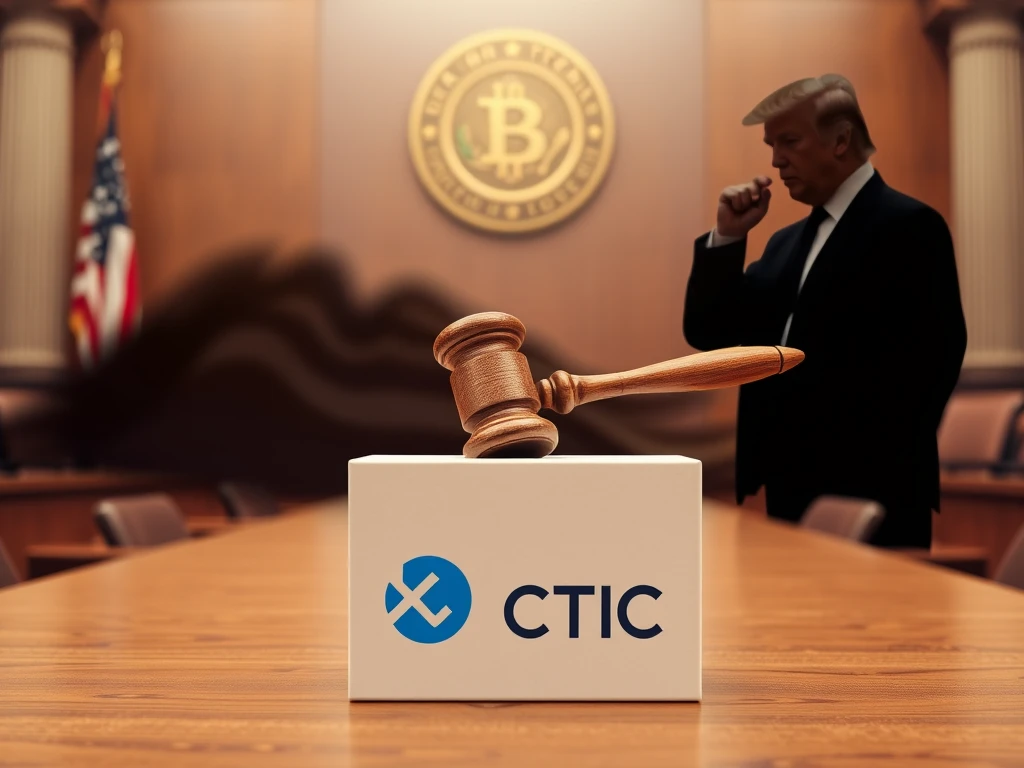Uncertainty Looms: KuCoin Settlement in Jeopardy After Shock Trump Policy

The cryptocurrency world is watching closely as the anticipated settlement between crypto exchange KuCoin and the U.S. Commodity Futures Trading Commission (CFTC) hits an unexpected snag. Just when a resolution seemed within reach, a policy shift linked to the Trump administration has thrown the agreement into doubt, leaving the future of the case hanging in the balance. What does this dramatic turn of events mean for KuCoin, the CFTC, and the broader landscape of crypto regulation?
Trump Policy Shift Creates Uncertainty for KuCoin Settlement
The core issue stems from a reported change in priorities at the CFTC. Under the Biden administration, negotiations progressed towards a settlement with KuCoin, which faced charges of violating the Commodity Exchange Act (CEA) and CFTC regulations. However, a recent statement by acting CFTC Chair Caroline Pham suggests a deprioritization of cases against crypto companies. This shift, occurring under the shadow of a potential Trump administration influence, has led CFTC attorney John Murphy to request more time to secure approval for the KuCoin deal. He stated in a letter to District Judge Valerie Caproni that authorization for the settlement is now “unlikely in the near term.”
What are the Charges Against KuCoin?
The CFTC’s charges against KuCoin are significant, alleging “multiple violations” of the Commodity Exchange Act and CFTC regulations. Adding to the pressure, the Department of Justice (DOJ) also filed charges against KuCoin and two of its founders for Anti-Money Laundering (AML) violations. According to the DOJ, KuCoin allegedly processed billions of dollars in suspicious funds:
- $5 billion: Amount received by KuCoin in suspicious and criminal funds.
- $4 billion: Amount sent by KuCoin in suspicious and criminal funds.
In a prior development, KuCoin reached a $297 million settlement with the DOJ in January, agreeing to exit the US market for at least two years. This DOJ settlement is separate from the CFTC case, highlighting the multi-faceted legal challenges facing the exchange.
The CFTC Stalemate and the Path Forward
The current impasse within the CFTC itself is a critical factor delaying the KuCoin settlement. Chair Pham’s announcement of winding down “regulation by enforcement” has created internal friction. The CFTC operates with a bipartisan structure, requiring a majority vote to dismiss or settle a case. Currently, the commission is evenly split with two members from each party. This deadlock means that even if there was internal support for the settlement previously negotiated, securing the necessary majority for approval is now a major hurdle.
A potential resolution could emerge if the Senate confirms Trump nominee Brian Quintenz to lead the CFTC. His appointment could tip the balance and provide the necessary majority to move forward – or further solidify the policy shift away from aggressive enforcement actions against crypto firms. Both KuCoin and the CFTC have requested a 60-day extension to allow for “definitive direction” from the Commission, indicating the uncertainty surrounding the immediate future of the case.
Broader Implications for Crypto Regulation
The unfolding situation with the CFTC and KuCoin raises crucial questions about the future of crypto regulation in the United States. President Trump’s executive order, mentioned in the original article, aiming to curtail enforcement actions against the digital asset industry, is a significant backdrop to these developments. This policy direction, combined with the internal shifts at the CFTC, could signal a broader softening of regulatory pressure on the crypto industry.
However, this potential shift is not without its complexities and potential downsides:
- Increased Market Risk?: Less aggressive enforcement could lead to increased market volatility and risks for investors if exchanges and crypto firms operate with less regulatory oversight.
- AML Concerns: Reduced scrutiny on AML compliance could exacerbate the flow of illicit funds through crypto platforms, as highlighted in the DOJ’s charges against KuCoin.
- Regulatory Uncertainty: The current state of flux creates uncertainty for crypto businesses trying to navigate the US regulatory landscape. Clear and consistent rules are essential for fostering innovation and responsible growth in the crypto sector.
Looking Ahead: What’s Next for KuCoin and Crypto Regulation?
The next few months will be critical in determining the fate of the KuCoin settlement and the broader direction of crypto regulation in the US. The confirmation of a new CFTC chair, any further policy announcements from the Trump administration, and the court’s response to the requested delays will all be key indicators. The crypto industry will be keenly observing these developments, as they could set a precedent for how regulatory bodies approach digital assets moving forward. Will the Trump policy shift lead to a more lenient approach, or will the CFTC find a way to maintain its regulatory mandate amidst political changes? The answer remains to be seen, but the stakes are undeniably high for KuCoin and the entire cryptocurrency ecosystem.
This evolving situation underscores the inherent dynamism and political sensitivities within the realm of crypto regulation. As governments and agencies grapple with how to oversee this rapidly evolving industry, businesses and investors must remain agile and informed to navigate the ever-changing landscape.








